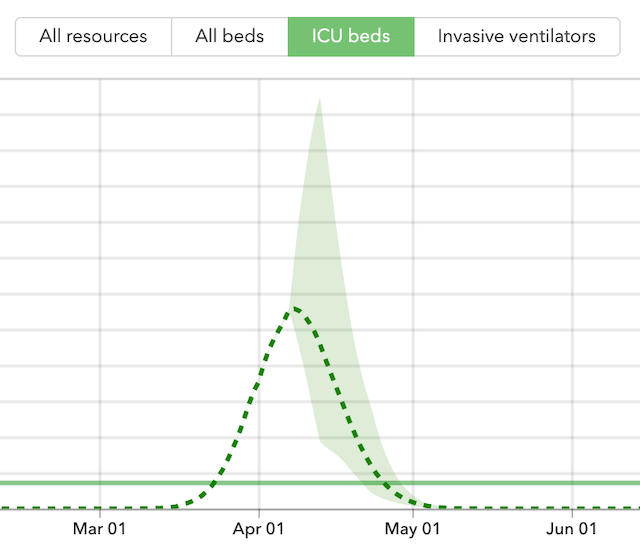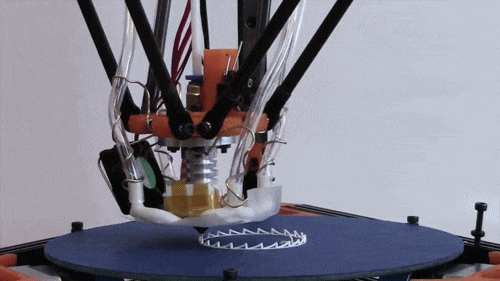Published by Dan Cunning on Apr 16, 2020
Exponentials in Pandemics and Innovation
Filed under Politics, Technology
Introduction
As the coronavirus shuts down much of the United States, exponentials are a normal topic of conversation. "Flatten the curve" is a rallying cry.
The powerful effects of exponentials are nothing new to those of us in the computer industry. The exponential growth of processing speeds, storage capacities, and transfer rates form the foundation of the modern digital revolution. However, exponentials aren't always allies, a linear approach under exponential pressure results in system crashes and failures which is why I've found it fascinating (and horrifying) to watch our real world systems buckle under the exponential spread of the novel coronavirus.
Why was the shutdown our only option? How could technological innovation strengthen our vulnerable systems, and what stands in its way?
The Shutdown

The number of ICU beds is the line and the number of ICU beds needed due to the virus is the exponential curve. Basically, when a linear system fights an exponential one, the linear system fails catastrophically. Let's look at the linear systems involved:
- The CDC couldn't identify and isolate the infected fast enough.
- The FDA couldn't approve treatments fast enough.
- The WHO didn’t uncover it spread person-to-person early enough.
- Commercial and government laboratories couldn't run tests quickly enough.
- Our federal stockpile of medical supplies and equipment was woefully under prepared.
- Hospital supply lines couldn’t get our doctors and nurses enough equipment to fight it.
Workers inside these systems have done an incredible job, but it was never going to be enough because their work couldn't scale exponentially. Our only effective weapon was our only exponential one: shutdown. Schools and sports leagues were first, then big cities, then entire states. The shutdown spread to people in our country faster than any virus could, and it bought our linear systems time to grow which will “raise the bar” (note the linear expression). Whether it’s raised high enough will be answered this summer, but the effects of such a sudden, widespread change are already pronounced.
Exponential Change
There are three major categories of exponential change:
- Biological: diseases, invasive species, evolution
- Technological: the printing press, flight, electricity, the Internet
- Psychological: fashion, trends, "the economy", 9/11
COVID-19 has shown that one exponential change starts a chain reaction: a new virus made people feel differently around one another, altering their behavior, causing a major economic event with almost certainly more change to come while our world's linear systems do their best to stay afloat.
The US Congress and the Federal Reserve started lending untold amounts of money. Some pundits declared that this catastrophe would have been avoided if the US had more law and order. After all, South Korea, Singapore, and Germany seem to be doing OK. All remedies to the failure of our centralized, unscalable systems seem to be centralized action and more powerful centralized systems. It is a short term fix now, but it's not a long term solution.
Importance of Decentralization
Companies and governments become linear when they overutilize command-and-control, and they fail when something they can't control overwhelms them, be it an industry shift, a political uprising, or a nasty virus. To compete against exponential forces, we must promote decentralization.
Decentralized systems solve problems by tackling them in groups and sharing what works with everyone else. Basically how hospital staff around the world are currently fighting COVID, but they are bottlenecked by linear systems: equipment supply lines, ventilators, and the number of doctors/nurses able to work. Decentralized systems are only as strong as their weakest dependency, and during times of exponential change these are centralized companies and governments.
Decentralizing companies and governments may sound like the work of bitcoin, science fiction, and anarchy, but it isn't. We merely need to flip from a society that relies on them to a society where they rely on us.
Exponential Technology
Inverting a top-heavy system happens through technological innovation. Not the innovation touted by tech companies like Google, Apple, and Facebook. They are actually psychological innovators, making their fortunes by changing the way people think and interact within platforms they tightly control. They only improve technology by tilting its line upwards. True technological innovation is exponential. Think electricity, human flight, the transistor: inventions that fundamentally change what's technologically possible.
COVID-19 has highlighted one such technology still in its infancy: 3D printing. When our supply lines with China (linear system) could not meet our demand for medical equipment (exponential problem), 3D printer enthusiasts realized they could help. From Sacremento and Huntsville to Canada, the Czech Repubic, and beyond designs for face shields and masks spread to organizers who built their own supply lines to hospitals in their area: no centralized authority commanding or controling, but individuals grouping together to help their communities. That's the power of an exponential system.

They won't save us from COVID-19, but imagine the 3D printers of today as the Ford Model T in 1908: not many people own one and they can’t do much … yet. Then imagine a next generation 3D printer attached to your old iPhone, some open source software, and assembly plans. Printing a functioning ventilator enters the realm of possibility. Could it also print clothing or medicine? Reducing the global supply chain of manufactured products to a supply line of raw materials and a printer in your community is revolutionary because your dependence on outside companies and governments shrinks substantially.
Barriers to Exponentials
When technology kickstarts a revolution, the world’s established players get weaker. You may have only heard about 3D printing through its gun-printing controversy, which debates whether governments should outlaw plans for printing guns in order to maintain their control over the distribution of firearms. Obviously the government can't remove files from the Internet, so the next logical step is to control who can own and operate 3D printers, destroying their exponential effect.
With exponential growth, most people don't know a powerful technology exists until it‘s part of a scandal or is a few steps away from being ubiquitous, making it especially vulnerable at the beginning when its detractors greatly outnumber its supporters. These detractors will fight to stop it, control it, or own it; normally in the name of safety and security.
Nuclear power once promised almost-free electricity to all Americans until a string of incidents and disasters halted all reactor construction indefinitely. Rightfully so: at the time the technology was more powerful than we could control, but 40+ years later we can. Bill Gates' TerraPower is capable of generating nuclear power from existing nuclear waste where meltdown is impossible. TerraPower was also collateral damage of the Trump trade wars with China.
Recycling is expensive because it takes a lot of energy to turn trash back into its raw materials. Nuclear power makes energy much cheaper and cleaner, making recycling more economically viable, creating a local supply line of raw materials for 3D printers. Just like COVID-19 started a horrible chain reaction, technological innovation can start an amazing one.
Conclusion
COVID-19 has made everyone feel more vulnerable. Once our centralized, linear systems failed everyone was exposed, and we had to rely more on our local communities. We need to make our communities stronger than ever before, and technological innovation can help.
The automation of manufacturing will certainly reduce our country’s reliance on China, and by distributing the means of scalable production to people in or closer to our communities it could also reduce our reliance on the federal government and multinational corporations, but only if we keep them from killing it, owning it, or controling it.
Shortsighted actions "flatten the curve" of technological innovation without anyone ever noticing it happened.

I'm a Ruby on Rails contractor from Atlanta GA, focusing on simplicity and usability through solid design. Read more »